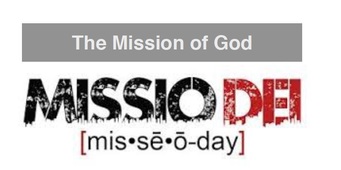|
Any evangelical church has a number of important functions it should value: preaching, groups, care, equipping, etc. (All of these are important!) Oftentimes, "missions" is tacked on here, as just one more "department" that should be included under the umbrella of local church leadership.
Now, I'm glad Brookside has staff leadership devoted to our Impact Ministries (Global Impact and Community Impact). But that doesn't mean the rest of us - those of us that aren't directly involved in a Go Team or serving specifically within Impact Ministries - are off the hook. That's because, fully appreciated, "missions" is not just one more department of a church, but mission is part of the very identity of the church - something that should weave its way throughout the life of the church. I love how Gregg Allison (leaning on Jurgen Moltmann) helps articulate this:
0 Comments
The Brookside Institute is all about "building and reinforcing foundations of the Christian faith." I recently wrote about the importance of BUILDING these foundations. In this post, let me briefly illustrate why REINFORCING foundations of the Christian faith is important.
In our first home, one of the cement block foundation walls in our basement had begun to bow inward, leaving a noticeable horizontal crack along the wall. And even more significantly, along this same wall water was getting into our basement whenever we got any amount of significant rain. I learned that this sort of foundation damage is fairly common, because of outside pressures such as shifting soil or water build-up. The foundation of this home - which was laid well initially - needed to be shored up in light of these changing circumstances. The foundation needed to be revisited and supported with wall anchors that maintained the wall's uprightness, and a water drainage system that channeled any incoming water to the right place. The solution was that we needed to reinforce the foundation. Foundations of Christianity are similar - they can erode or shift if not prepared for the shifting soils of our culture or other external circumstances. The foundations of our Christianity aren't something we lay once and then forget about. The foundations of our Christianity need vigilant attention and periodic reinforcing. Brookside Institute classes offer systematic, comprehensive instruction in the Christian faith. Institute classes are places where you can Dig Deep, Learn Good, and Launch well - all healthy components of reinforcing a strong foundation. Don't forget that Fall 2015 classes are now up and registration is "live." Check out what's coming and get signed up soon! It's important for Christians to think about church. The church is important. And as Christians, we're saved out of our sin and its consequences into (among other things) the church. But I wonder how many believers have stopped to really think about what being part of the church means? Does it just mean we lose the chance to sleep in on Sunday mornings? Or is being part of the Church that Jesus is building even better than we often think?
As I've studied the church - what she is, why she exists, and what "marks" should characterize her - I've found the answer is the latter: being part of the Church that Jesus is building is AWESOME. It's awesome because of the PEOPLE that make up the church, the PURPOSES that propel her, and the PRIORITIES that shape her. This "awesomeness" invites further study, so we can better appreciate all that God is doing in and through the church. With this in mind, I want to encourage you to read one book on Ecclesiology (that's the fancy word for the doctrine of the church) this year. If you're looking for suggestions, here's a starter list of 6 to choose from, listed alphabetically by author. (Each is linked to its page at Amazon where you can explore a bit further.) Oh yeah, and don't forget to keep current with Brookside's current sermon series (Aug 16-Sept 6, 2015), "I Love My Church"!
Many of you know that the Brookside Institute is all about building and reinforcing foundations of the Christian faith. A big way this happens is through classes we offer that ground and grow people in the faith - classes where people and Dig Deep, Learn Good, and Launch Well.
But let's be honest: We need a lot more than just classes to do this. One of the additional ways we can build and reinforce foundations of the Christian faith is by instructing our families and interacting with them about Christian truth, values, and behavior. Parents are not a cul-de-sac of equipping, where truth enters but can't proceed. In the biblical picture of families, parents are a conduit of a biblical worldview, "owning" Christian truths and value themselves, and then passing these same truths and values along to their children. (Check it out in Deuteronomy 6:4-9.) All this is why I'm so excited about Kevin DeYoung's new book, The Biggest Story: How the Snake Crusher Brings Us Back to the Garden. The Brookside Institute is all about "building and reinforcing foundations of the Christian faith." Foundations matter! In this post, let me briefly illustrate why BUILDING foundations of the Christian faith is important. My wife and I are currently in the process of putting a shed up in our backyard. Rather than just starting to construct the shed on top of the ground, however, we spent lots (lots!) of time working on the foundation on which the shed would stand. We spent lots of time leveling the ground. We used manual posthole diggers to dig 15 footings, each 20-24" deep. It took organization and effort to pour the concrete, and make it both even and smooth. The foundation of our shed is important, because I don't want to walk towards my shed after it's completed and see it leaning at a 45 degree angle. A strong foundation will stabilize and strengthen anything that depends on it. Neither do I want to walk into my shed next month and discover a crack that is 8" wide in the concrete floor. Spending time on the foundation ensures that it will remain secure and solid. Foundations of Christianity are similar - they provide stability and strength on which future growth can depend. (And future growth should happen!) Foundations help ensure our Christian faith is grounded in something that is secure and solid. Brookside Institute classes offer systematic, comprehensive instruction in the Christian faith. Institute classes are places where you can Dig Deep, Learn Good, and Launch well - all healthy components of a strong foundation. Don't forget that Fall 2015 classes are now up and registration is "live." Check out what's coming and get signed up soon! In your own words, why are strong foundations vital for a healthy Christian faith? How can classes contribute to a strong foundation?
On Thursday and Friday of this last week, I attended the Global Leadership Summit, a leadership conference I've attended for probably the last 10 years or so. The Summit features a diverse faculty of presenters - some I've heard of before, some I've not - and every year I walk away having learned worthwhile lessons that can shape my leadership and ministry. (Check out some of the ways I benefited from last year's Summit by clicking here.)
This year, one of the speakers who grabbed my attention most was a guy by the name of Ed Catmull that I wasn't really familiar with. (Though I am familiar with his body of work. Ed Catmull is the President of Pixar Animation - the studio that brought us Toy Story, Wall-E, The Incredibles, Inside Out, and more.) I especially resonated with two statements Catmull made. Both statements align closely with what we're trying to through our classes at the Brookside Institute - even if these points seem counterintuitive to how people normally think about classroom and equipping environments. My wife is a big fan of putting lime on watermelon. These two foods - lime and watermelon - are fine by themselves, by the way. Most people don't think about putting these things together. (Or at least I don't.) But when you do put them together, the taste is awesome. Putting these two things together actually makes a better result than when they're consumed independently.
This semester I'm scheduled to be back teaching at Grace University, and I'm putting two categories of systematic theology together that most people may not think about putting together. I'm teaching a class on "Church and Last Things" (or, if you want the fancy terminology, on "Ecclesiology and Eschatology"). As different people have learned what I'm teaching, a very understandable follow up question has been this: "So what do those two things have to do with each other, if anything?" Were random, hermetically-sealed categories of systematic theology just thrown together, or is there a relationship between the Church and Last Things that can be appreciated? What does Ecclesiology have to do with Eschatology? |
Tim WiebeChristian. Husband. Father. Pastor. Learner. Contributor. Reader. Categories
All
Archives
June 2024
|
© 2014-2024 | 11607 M Circle, Omaha NE, 68137 | www.thebrooksideinstitute.net








 RSS Feed
RSS Feed
